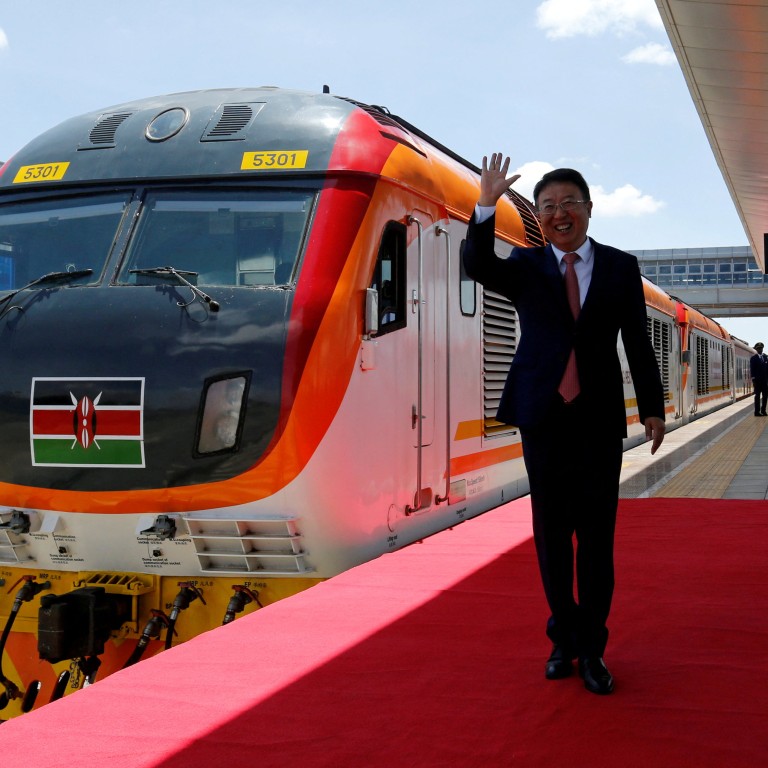
China given advantages in loan for Kenyan rail project, contract shows
- Beijing got preferences in financing the construction of a railway in Kenya eight years ago, a project that is part of its Belt and Road Initiative
- The Kenyan transport minister says the current debt repayment schedule is choking the country’s revenues
The Kenyan government has disclosed some details of loan agreements with a Chinese bank that show Beijing got an upper hand in financing the construction of a railway eight years ago.
The agreement with the Export-Import (Exim) Bank of China stipulated that most of the construction materials for the Standard Gauge Railway – Kenya’s most ambitious and expensive project since 1963 and part of the Chinese Belt and Road Initiative – be sourced from China.
Further, the contract noted that goods and services procured for the construction of the railway be free from taxation by the Kenyan government.
Kenya took three loans for the construction of the railway running from the port city of Mombasa to the capital Nairobi with an extra extension to Naivasha, a town in Central Rift Valley. But tough conditions diluted one concessional loan of the US$1.6 billion deal, and two other loans were mostly given at market rates.
China was also given a legal advantage with articles that stipulate, in case of disagreements among the parties, that arbitration would take place in Beijing, the documents show.
“If no settlement is reached through friendly consultation, each party shall have a right to submit a dispute to the China International Economic and Trade Arbitration Committee for arbitration,” the loan contract says.
In the documents shared by transport minister Kipchumba Murkomen, China was to lend Kenya US$1.6 billion at 2 per cent annual interest with a grace period of seven years. The loan was scheduled to be paid in 156 months, until January 21, 2034.
Another US$2 billion commercial loan, which has a varying interest rate and a five-year grace period, will be paid in 20 equal instalments with the repayment period ending in January 2029.
The Kenyan government will need to pay US$179.8 million for an export credit insurance policy from Sinosure, the Chinese export credit insurance company, for this commercial loan.
The second phase of the railway, which saw the line extended from Nairobi to the resort town of Naivasha in Central Rift Valley, received US$1.48 billion, bringing the total amount that Exim Bank disbursed to Kenya for the project to US$5.08 billion. The loan is being repaid in 30 instalments from January 21, 2021, to July 21, 2035.
China’s rail spending spree in Africa is over but it still dominates
The Kenyan minister called for an extension of the repayment period, suggesting a 50-year term rather than the established 20 years. He noted that the current repayment schedule was choking the country’s revenues.
“The problem with the [Standard Gauge Railway] is that we took a loan of 20 years on an infrastructure of 100 years. It becomes impossible to pay that loan by revenues that come from the railway,” the new minister said during his vetting in Parliament last month.
Murkomen shared part of the loan agreements to honour President William Ruto’s promise to the electorate during the presidential election campaign in August. But Murkomen has yet to make public the main contract, reportedly because of non-disclosure clauses in the deal.
Wu Peng, director general of the Chinese foreign ministry’s department of African affairs, said in September: “When we signed the agreement, there was a commercial secret agreement. That is a very common commercial practice.”
Wu said Kenya would be in breach if it made the deal public. “The spirit of contract is the cornerstone of doing business. If there is no spirit of the contract, how can we do business?”

The railway has been hotly debated in Kenya, and was at the heart of the discussion in the last elections. Ruto, who was sworn in as president in September, reversed an earlier decision by Kenya’s port authority to put all cargo destined for Nairobi and further onto the rail line.
It was supposed to stretch to the western border town of Malaba before passing through Kampala, Uganda, and into Kigali, Rwanda. Actual construction of the Mombasa-Nairobi line started in January 2015, eight months after the signing of the two agreements, and was completed in early 2017.
However, Uganda and Rwanda are yet to start construction of their parts of the rail line, with reports swirling that the Chinese government denied Kenya funds for the extension to Malaba over fears about the project’s commercial viability.
Kenya may be learning from Ethiopia, which in 2018 was successful in achieving a 20-year extension in repayment for its Chinese-financed railway. When Ethiopia struggled to service the US$4 billion debt it took on to build a modern railway with Djibouti, it sought help from Beijing and had its loan rescheduled by China Exim Bank by extending the repayment period from 10 to 30 years.
When Covid-19 struck in 2020, Kenya was one of the countries that benefited from a loan repayment moratorium from China.


